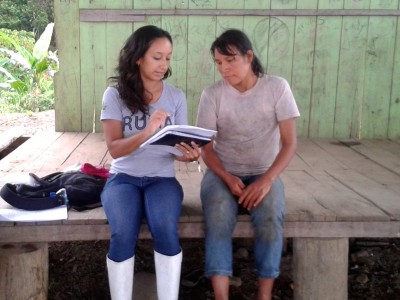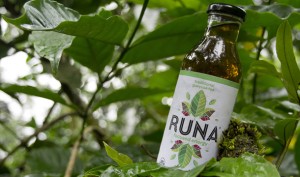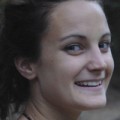Aliana Pineiro is a 2012 graduate of the Graduate Program in International Affairs, she concentrated in development. She currently works for Runa in Tena, Ecuador ( ‘where the foothills of the Andes meet the Amazon’) where she is Director of Monitoring and Evaluation. ‘Runa works with over 2500 indigenous Kichwa farmers that grow guayusa, a tree native to [the] area, the leaves of which are used to make an infusion that has caffeine and antioxidants that the indigenous people have been drinking for over 1000 years. Runa uses an innovative hybrid for-profit/non-profit business model to help communities earn additional income, learn new farming techniques and management skills while protecting the forest.’
interview conducted by Benjamin Ace
Please tell me a little bit about your background and how you came to attend The New School.
I majored in International Relations at Boston University but when I graduated in 2005, I couldn’t find a job that would pay and provide health insurance, so I took a client service job at a mutual fund company in Boston. In 2006 I moved to New York City with aspirations of working in an international non-profit, but again couldn’t find a job so I continued in finance at an asset management firm. Finance really pulled me in, I found that I was good at what I did and I had great coworkers, so I stayed at that job for 5 years. However, I always felt like something was missing, even though I liked by job, I knew I wanted something different, something more international and something that actually helped people. So in 2009 I decided to go back to school part time. I liked the New School program because you could switch between part time and full time and many people also worked or had internships. Finally in 2011 I left my job to study full time and do a few internships. I graduated from GPIA in January of 2012.
How did you end up working for Runa?
I was an intern at Runa during the summer before I graduated from The New School, and after that did my Masters Practicum with Runa on Fair Trade certification and the formation of the cooperatives. They were looking for a Director of M&E and I was there at the right place and right time!
When was Runa started?
Two Brown University students started Runa in 2009 [with the goal to] bring a new, organic, healthy product from the Amazon to consumers in the US. Their goal was (and continues to be) to add value to traditional Kichwa agroforestry systems in order to support economic development and conservation at the same time.
How does the hybrid for-profit/non-for-profit business model that Runa uses work?
The for-profit side of the organization focuses on buying guayusa from farmers, processing, exporting, packaging, marketing and sales. The non-profit side of the organization works on plant/crop research, community development, including facilitation for the farmer cooperatives, public policy and runs international and local internship programs. We often collaborate on projects, but it is important to note that all funding for the non-profit side comes from grants and donations and not from the for-profit side of Runa. This allows the non-profit side to act as a watchdog when it comes to the farmers and the environment.
What effects do you see your work with Runa having on the local population?
I am part of a small team of facilitators that works with the cooperatives on their development and trainings. This is helping guayusa farmers get organized and hopefully will allow them to take more control of the value chain. When I first started as an intern in June of 2011, there were just committees of farmers with little understanding of planning or the process of organizing, now there are 9 organizations in the process of getting legalized. Through an interactive learning process, they have each created plans for how they will be spending their Fair Trade Social Premium funds this year and they are taking more ownership of the legalization process of their cooperatives.
What is one challenge that you are currently facing in your job at Runa?
A constant challenge when working in development is trying not to get disillusioned when things get hard. Sometimes I question why I am here or if I am really helping anyone. I think it is good to really evaluate if you or the organization that you work for is doing good work, and every time this comes up, I remind myself that we are doing great work here at Runa.
What classes most prepared you for your job at Runa?
I found the classes that I took with Max Fraad-Wolff to be fun and insightful, especially since I have a background in finance. Also, Michele Kahane’s class in Emerging Trends in Social Innovation and Social Investment is a must for all students who are interested in social business and corporate social responsibility.
What advice would you give to current students?
Internships are key! Impress your internship supervisors and keep in touch with them after, they will help connect you to future job opportunities and give you recommendations. Also connect with alumni! Don’t be shy about contacting people with questions about their field or workplace.






